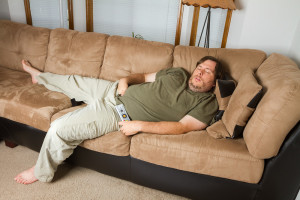It is fast becoming a matter of life and death. Worldwide, everyone from Prime Ministers and Presidents to family doctors and health authorities are urging us all to exercise more for improved health and well-being. And they are saying this for a very good reason.
Obesity and lifestyle diseases are crippling our countries coffers. Health costs all around the world are spiraling out of control and people don’t appear to be concerned.
Why?
Because recent figures suggest something like 70% of the problem is from lack of exercise and poor diet choices…….in other words it is our modern day lifestyle and it is slowly killing us……and we need to do something about it and in a big hurry.
 Yet as the couch potato unfortunately becomes a symbol of an alarmingly obese population, we fashion more and more excuses for not seriously committing to physical activity which is well proven to vastly improve your quality of life and the ongoing medical problems of all people and all nations.
Yet as the couch potato unfortunately becomes a symbol of an alarmingly obese population, we fashion more and more excuses for not seriously committing to physical activity which is well proven to vastly improve your quality of life and the ongoing medical problems of all people and all nations.
Latest medical research findings reported in the mass media confirm that, for most people, regular ongoing exercise helps to ward off most lifestyle diseases and to rehabilitate the body from most diseases that have already been contracted. In other words, the problem can be reversed as well as delayed for many years. This is backed up by a Science Daily article headed “Exercise adds years to life and improves quality.”
The article also goes on to say, “Exercise is a lot like spinach – everybody knows it’s good for you; yet many people still avoid it, forgoing its potential health benefits.”
The hardest thing I have found is convincing people they need to change their ways. Like understanding that every time you eat or drink, you are either feeding disease or fighting it. So it always comes back to being your choice.
It is fair to say some of these findings have been oversold as guaranteed life extenders by well-meaning authorities eager to persuade a generation that stubbornly disdains physical activity. But there is a hugely powerful case that a society with unprecedented rates of afflictions like obesity, diabetes and hypertension needs a kick in the rear end to avoid more and more lives characterized by disabling chronic lifestyle illnesses. No one wants that. But it is no good sitting back and saying “it won’t happen to me”. It is the ‘sitting’ that is a big part of the problem.
From my experience, lack of time and cost are two of the most common excuses offered not to follow a regular exercise program.
It is quite plausible that people working longer hours to keep up modest life styles would not easily find the time or money for a regular exercise program. But the necessary physical activity, which can be as little as 30 minutes a day (plus warm-up and warm-down time) according to some authorities (although a bit more is better), can be achieved by a brisk morning or evening walk before or after work, or by riding a bicycle.
For those who would be daunted by the weather, there is ample walking room at many indoor malls and shopping centres, stairs in high rise buildings as well as stationary bikes or rowing machines that will fit into a small space at home. So getting started on a sustainable regimen doesn’t require much in the way of expenditure or disruption of routine.
These days many responsible and concerned employers, convinced of the cost benefits of a fitter workforce, have established exercise programs on or near their premises with useful equipment and generous allowances of time before or after work or during lunchtime. I really applaud workplaces that offer this benefit to their staff and I would encourage all staff to take the offer and participate. Your body will thank you.
If cost is not a deterrent, there are many more good choices, of course. These include fully equipped gyms with convenient hours and locations, and even personal trainers for those whose excuse is, “If I only had someone to show me what to do.” In fact most people find working out with a friend or a group is just the inspiration they need to get going and to keep going.

The important thing is to just get started (and don’t stop). You will end up feeling much better about both yourself and your body and that will give you the motivation to keep going. Then it becomes a daily habit – and a good one too.
Take it from me, if you want to have an active and enjoyable old age (and due to medical advancements we are all living longer) and enjoy your latter years without being debilitated by the burden of serious lifestyle diseases that can be easily avoided then start an ‘active ageing’ program today and just keep it going.
As the old saying goes – use it or lose it. How true!
I feel this universal paradox explains what I have been alluding to really well: “You are free to choose but you are not free from the consequences of your choice.”
This article you wrote was very interesting John, I also found it very frightening. I realise if I don’t get serious about my health now I will be in all sorts of trouble later on in life. Thank you for the article 🙂
I appreciate your comments Nat and I am really pleased my writing was able to motivate you to get serious and take the next big step. Good luck and best wishes.